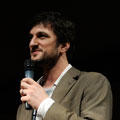Director Marshall Lewy and his daughter, Beatrice, at a screening of California Solo. Photo by Stephen Speckman.
Jeff Hanson
Marshall Lewy premiered more than his film, California Solo, at the 2012 Sundance Film Festival. As he came out to welcome an enthusiastic crowd Wednesday night, he also revealed his one-month old daughter, Beatrice, who actually waved a tiny hand to the audience. It was a sign of good things to come.
Lewy’s film, which he wrote and directed, was carried onscreen by Robert Carlyle in arguably his best performance since Trainspotting. It tells the story of ex-rock legend Lachlan MacAldonich, the down-but-not-out guitarist from a band with an equally tragic past. Lachlan’s best days have long since past and his life finds him in the more obscure (and less groupie-filled) world of organic farm life in Southern California. As Lachlan tries to “podcast” himself away from his former life, he is picked up on a DUI charge and faces possible deportation back to the UK, unless he can prove that his absence would cause “extreme hardship” for someone––anyone––in his life, which opens up a whole new can of demons.
In the spirit of its protagonist, California Solo carries a songlike quality to it as well, with a rich soundtrack and fluid storytelling that fits snugly with its organically rich setting and falls right into Carlyle’s prodigious acting wheelhouse. After the screening, Lewy was joined for a Q&A by members of the cast and crew, which included A Martinez, Alexia Rasmussen, and Savannah Lathem.
Q: What inspired the story and where did it come from?
Lewy: In case you hadn’t noticed, there’s a lot of Robert Carlyle in there. The movie really started with the character. I had an idea for taking a renowned character actor from the UK and putting him in an American independent film. I wrote the part for Robert, and I had his voice in my head as I worked on the script.
Q: Was this something that Robert was into…or did you have to convince him?
Lewy: I read in an article that he met his wife at The Hacienda, the nightclub which is kind of the Studio 54 of the Manchester, England scene, so when I put that in the script I kinda’ knew he would do it. I sent it to him, and after he read it for a couple of days we got on the phone and he said, ‘I have one question. Do you do rehearsals?’ I said ‘no.’ He said, ‘Good, I’ll do it.’
Q: To the actors, what was your experience with the production?
Martinez: The experience of the audition was one of the most actor-friendly auditions in my very long career. I thought that was a really good sign. The generosity and respect that was afforded to me in the audition carried all the way through the film. It was a dream to work on this film. Marshall never allowed you to think you could do something that was wrong.
Q: Can you talk a little bit about the music in the film?
Lewy: It was music I loved listening to when I visited a couple of friends in Ireland during college. Then I came back with all this music and I listened to it while I wrote the script. As far as it relates to the character, the music also has a lot of heart and there was something there that seemed to fit with this character and what he was going through and what he was hiding from.
Q: Where did you get your legal advice on the DUI and immigration situation?
Lewy: I talked to an immigration lawyer I knew and that is really where the story came from. I started to understand more about the fact that people with a green card, who are permanent legal residents and who have been living here for 15-20 years and have families, can be removed for an offense. I learned about the bureaucracy of how it happened, and thought that was a thread, a spine for a movie.




